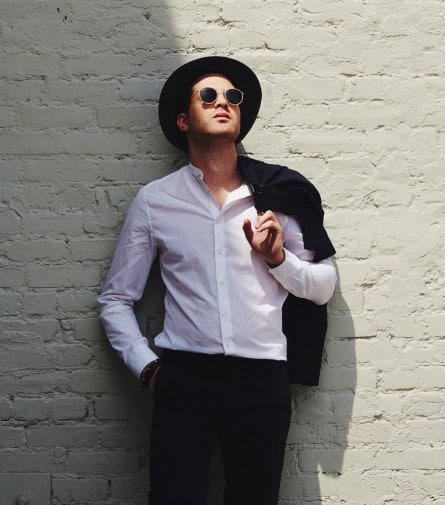Videos by American Songwriter
When you’re the son of a famous actress, it can be hard to have your art taken seriously by the masses. In Henry Wolfe‘s case, that’s not a problem. The Los Angeles singer-songwriter’s impressive debut, Linda Vista, practically demands repeated listening. We asked Wolfe about recording his critically-lauded album, his choice of moniker, and more.
Your mother is Meryl Streep. Is that why you took the last name Wolfe?
Wolfe is my middle name. It was given to me so I thought I might as well use it.
Your grandfather wrote songs as well.
He was songwriter by hobby, and opted for the stability of a day job in order to raise a family. I’m glad he did or I might not be here!
You took three years to make Linda Vista — can you break down how that actually worked chronologically?
I moved to LA in 2007, and wrote most of the songs that ended up on the record over the next few years. I wanted to work with my friends Nico Aglietti and Aaron Older, who had just started working on the Edward Sharpe record, Up From Below when I moved out. It took them a year to finish that record, and then they were on the road for a year. We finally got to work in the winter of 2010 and finished up that summer. It was an exercise in patience, working around their schedule but I’m really happy with how everything turned out.
Linda Vista was influenced by Paul McCartney’s Ram and Harry Nilsson’s Nilsson Sings Newman. How so?
Those records were given to me at a time when I was looking for new songwriting inspiration and they ended up being gateways into the work of Harry Nilsson, Randy Newman, and Paul McCartney (post Beatles), all of whom I’d never really listened to. I was particularly influenced by the humor and wit in their lyrics.
How did you go about recording Linda Vista — what did you record it on, if not a computer?
We recorded it on an Ampex 24 track tape machine, on 2’’ tape and mixed down to 1/2’’. There was very little compression and we only digitized the tracks during the mastering process. Sonically, the record doesn’t have a lot in common with contemporary music you’d hear on the radio, which was our intent. We prefer the sound of analogue recordings.
You like to teach yourself jazz standards. Why?
Because the chord changes are often more complex and interesting, from a musical/compositional standpoint, than your average rock or folk song. I want to emulate those song structures, so I learn how to play them.
What’s a lyric you’re particularly proud of on the album?
“If you’re thinking of leaving, you’re already gone.” From “The Third Act.”
Are there any words you love, or hate?
I don’t care for the word “fan”.
How do you typically write songs? Words first, or melody?
Melody first, pretty much always.
Do you find yourself revising a lot, or do you like to write automatically?
I revise a lot. It often takes me years to finish songs. Others come faster, but I’m very deliberate about the choices I make and I won’t release a song until I feel it is finished and I’m proud of it.
Who’s an underrated songwriter, in your opinion?
What’s a song you wish you’d written?
“Imagine.”














Leave a Reply
Only members can comment. Become a member. Already a member? Log in.